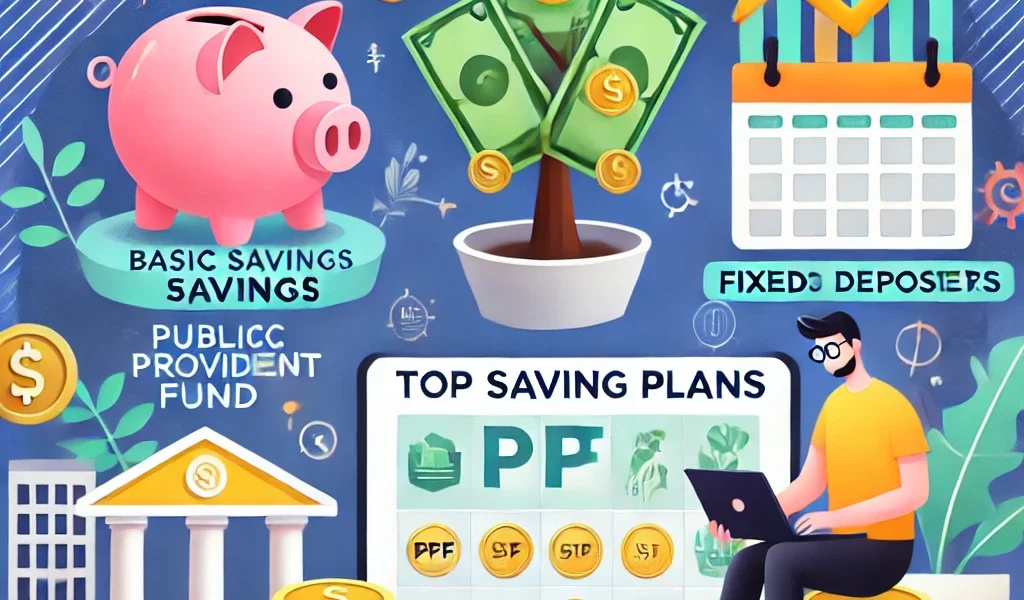Starting your financial journey can be overwhelming, but the right saving plans can set you on the path to a secure future. Saving plans are essential for building wealth, preparing for emergencies, and achieving long-term goals. In this guide, we’ll explore the best saving plans tailored for beginners and how they can help you secure financial stability.
Why Beginners Should Start Saving Early
- Benefit from Compounding: The earlier you start, the more time your money has to grow through compound interest.
- Financial Discipline: Early savings habits build a strong foundation for managing finances effectively.
- Prepare for Emergencies: A robust savings plan acts as a safety net during unexpected situations.
- Achieve Goals Faster: Systematic saving helps you reach milestones like education, travel, or buying a home.
Top Saving Plans for Beginners
- Recurring Deposits (RD):
- What It Is: A bank account where you deposit a fixed amount monthly for a specified tenure.
- Benefits: Guaranteed returns, low risk, and easy to start.
- Ideal For: Beginners who want to save small amounts consistently.
- Public Provident Fund (PPF):
- What It Is: A government-backed long-term savings scheme with tax-free returns.
- Benefits: Attractive interest rates, tax benefits, and secure investment.
- Ideal For: Long-term goals like retirement or education.
- Savings Accounts with Sweep-In Facility:
- What It Is: A savings account linked to fixed deposits for better returns on surplus funds.
- Benefits: Liquidity combined with higher returns.
- Ideal For: Flexible savers who want easy access to their funds.
- Fixed Deposits (FD):
- What It Is: A one-time deposit in a bank for a fixed period with a guaranteed interest rate.
- Benefits: Safe investment, predictable returns, and flexibility in tenure.
- Ideal For: Beginners looking for stable and secure savings options.
- Systematic Investment Plans (SIPs):
- What It Is: A method to invest in mutual funds by contributing a fixed amount periodically.
- Benefits: Market-linked returns, potential for wealth creation, and disciplined investing.
- Ideal For: Beginners with a higher risk appetite and long-term goals.
- Employee Provident Fund (EPF):
- What It Is: A retirement savings scheme for salaried individuals where both employer and employee contribute.
- Benefits: Tax benefits, employer contributions, and secure growth.
- Ideal For: Salaried professionals aiming for retirement savings.
- Post Office Savings Schemes:
- What It Is: Government-backed savings options like NSC and RD offered through post offices.
- Benefits: Safe investment, small contributions, and guaranteed returns.
- Ideal For: Beginners in rural or semi-urban areas.
Tips for Beginners to Maximize Savings
- Start Small: Begin with a plan that suits your budget and gradually increase contributions.
- Set Clear Goals: Define your financial objectives to choose the most suitable saving plan.
- Review Periodically: Regularly assess your savings and adjust based on life changes or goals.
- Leverage Tax Benefits: Opt for plans like PPF or EPF to save on taxes while building wealth.
- Automate Savings: Set up automatic transfers to ensure consistency and avoid missed contributions.
Common Mistakes to Avoid
- Delaying Savings: Procrastination leads to missed opportunities for compounding.
- Ignoring Emergency Funds: Always prioritize building a fund for unforeseen expenses.
- Overlooking Inflation: Choose plans that provide returns above the inflation rate to preserve purchasing power.
- Not Diversifying: Avoid putting all your savings in one plan; diversify to balance risk and reward.
Conclusion
Starting early with the right saving plans is the key to financial security. Whether you’re saving for short-term needs or long-term goals, there are plenty of beginner-friendly options to suit your needs. Remember, the most important step is to start—every small contribution adds up over time.




